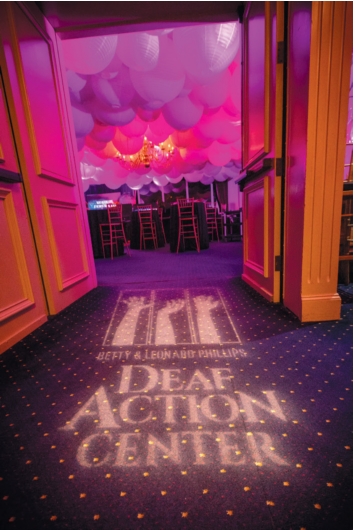Helping People Cope With Hearing Loss

Deaf Action Center Extecutive Director Wendy Coker and Collin Phillips, board president.
Las Vegas Night to benefit Deaf Action Center
Writer’s note: The word deaf is capitalized when it is used to describe a class of people. It is lowercase when used as an adjective.
Sound is something you can take for granted. To the Deaf, that is a luxury they are not afforded. The everyday activities we take part in depend on hearing and are greatly affected by its loss.
Imagine being pulled over in traffic by a police officer. (Yes, Deaf can drive. Think of them as people with their EarPods in.) You see the flashing lights in the rear view, but there’s no siren to catch your attention. You get the same sinking feeling in your chest as you pull to the curb. That gets worse when an authority figure in a uniform steps up to the window and begins speaking. Even if you can, lip-reading in such a situation is tricky and fraught with miscommunication.
There are approximately 18,000 deaf, deaf/blind and hard-of-hearing people in the seven-parish area of north Louisiana served by the Betty and Leonard Phillips Deaf Action Center. An episode like a routine traffic stop is not unheard of.
The Deaf Action Center (DAC) began in 1982 after Betty Phillips had attended a performance by the National Theatre of the Deaf. Fascinated, she discovered there was a need for deaf services in her own backyard. Her grandson, Collin Phillips, now serves as the organization’s board president. The passion for helping appears hereditary.
“To help human beings is something very exciting,” he said. “I believe in this center being passionate about people and their needs.”
DAC’s Executive Director is Wendi Coker, who also shares that passion. “I’ve been here since I was 19. I worked eight years, left and went into law enforcement for eight years, but I still interpreted, so I was still affiliated. Been back almost 18 years.”

Coker and her staff, including about 10 full- and part-time sign language interpreters, are gearing up for DAC’s major biannual fundraiser, Las Vegas Night. The event will be held this year at the Petroleum Club in downtown Shreveport on Saturday, Dec. 13, at 7 p.m. The price of admission is $250 and includes a chance to win $500 in chips to play casino games, blackjack, roulette and craps with expert dealers. There will be an open bar, an extensive buffet and the chance to bid on a large variety of items in live and silent auctions.
Coker and Phillips stress that the evening is much more than just a glitzy party with fancy prizes and fabulous food and drink. They say it’s the lifeline for all that DAC does, ensuring their clients have the critical funding needed to sustain essential programs and that the Deaf, Deaf/Blind and Hard-of-Hearing community has access to the resources and support they need.
“It’s not always easy getting funding for the deaf community,” Coker explained. “They’re overlooked a lot. When you look around at [Las Vegas Night], you see the people who really believe in what you’re doing. There are some very passionate people planning the [event]. And the [Phillips] family, they are such an intricate part of this. If it weren’t for them, we wouldn’t have Las Vegas Night. We wouldn’t have the support that we have.”
Phillips is quick not to accept all the thanks. “Without the support of the [local] community, we wouldn’t have this [DAC] now. The community steps up, and thanks to Wendi and the team, we’ve had a great year to help the center move forward, which I am very proud of.”
“What I feel like is even more important,” Coker emphasized. “Interpreting is absolutely, extremely important. When I think of Las Vegas Night and what it lets us do, have programs such as our independent training. We have ‘hands-on’ independent training. We bring them in and teach them what to say at a job interview, what not to say. How to grocery shop on a budget. How to manage a budget, how to pay bills, how to live independently.”
She added that Las Vegas Night allows DAC to have its Community Advocate position, which is not a funded position. She explained that, since American Sign Language is not a written or spoken language, it requires an interpreter to facilitate communication between the deaf and hearing people in any communication setting. The Community Advocate provides that vital link, allowing deaf people to have regular social interactions.
The proceeds will also help DAC launch projects like Direct Connect, which will place video devices in high-traffic areas such as hospitals and police departments, enabling electronic connections with interpreters to assist in meeting the needs of the Deaf, Deaf/Blind and Hard-of-Hearing populace.
Coker said it’s only the encouragement of the Phillips and Kallenberg families, the generosity of the local community and the hard work of the DAC staff and volunteers that make living in a world of sound more accessible to those who use sign language as the primary means of communication.
For more information, https://deafactioncenter.org, https://deafactioncenter.org/events or call (318) 425-7781.
